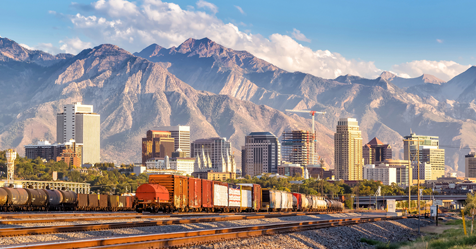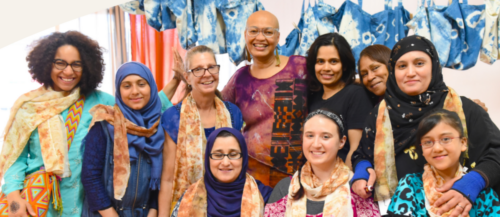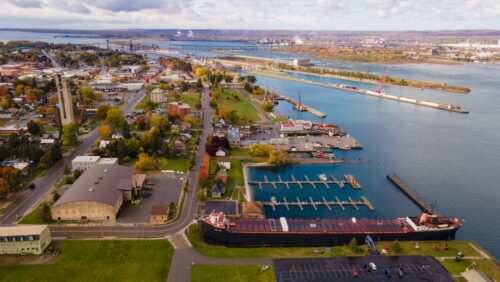Utah has a sizable community of immigrants, many of whom emigrated from Mexico. Roughly 1 in 11 Utahans was born in another country, and a similar proportion of residents are native-born Americans with at least one immigrant parent. The majority of immigrants speak English well and are naturalized citizens or eligible for naturalization.
Across sectors, immigrants are an important part of the state’s labor force and support Utah’s economy. Immigrants represent nearly one-fifth of residents working in the construction industry, while Utah’s hotel and food services industry relies on immigrants for 16 percent of its employees. As neighbors, business owners, taxpayers, and workers, immigrants are an integral part of Utah’s diverse and thriving communities and make extensive contributions that benefit all.
Nine percent of Utah residents are immigrants, while 9 percent of residents are native-born U.S. citizens with at least one immigrant parent.
- In 2018, 271,222 immigrants (foreign-born individuals) comprised 9 percent of the population.
- Utah was home to 125,144 women, 124,062 men, and 22,016 children who were immigrants.
- The top countries of origin for immigrants were Mexico (35 percent of immigrants), India (4 percent), Venezuela (4 percent), Peru (4 percent), and Canada (3 percent).
- In 2018, 269,650 people in Utah (9 percent of the state’s population) were native-born Americans who had at least one immigrant parent.
Two out of five immigrants in Utah are naturalized U.S. citizens.
- 111,797 immigrants (41 percent) had naturalized as of 2018, and 44,401 immigrants were eligible to become naturalized U.S. citizens in 2017.
- Nearly four in five (79 percent) immigrants reported speaking English “well” or “very well.”
Immigrants in Utah are distributed across the educational spectrum.
- More than one-fourth (27 percent) of adult immigrants had a college degree or more education in 2018, while one-fourth (25 percent) had less than a high school diploma.
|
Education Level |
Share (%) of All Immigrants |
Share (%) of All Natives |
|---|---|---|
|
College degree or more |
27 |
36 |
|
Some college |
22 |
37 |
|
High school diploma only |
26 |
22 |
|
Less than a high school diploma |
25 |
5 |
|
Source: U.S. Census Bureau, 2018 American Community Survey 1-Year Estimates. |
||
Tens of thousands of U.S. citizens in Utah live with at least one family member who is undocumented.
- 95,000 undocumented immigrants comprised 38 percent of the immigrant population and 3 percent of the total state population in 2016.
- 140,517 people in Utah, including 71,207 U.S. citizens, lived with at least one undocumented family member between 2010 and 2014.
- During the same period, about 6 percent of children in the state were U.S. citizens living with at least one undocumented family member (55,516 children in total).
Utah is home to thousands of Deferred Action for Childhood Arrivals (DACA) recipients.
- 8,490 active DACA recipients lived in Utah as of March 2020, while DACA has been granted to 10,688 people in total since 2012.
- As of 2019, 74 percent of DACA-eligible immigrants in Utah had applied for DACA.
- An additional 3,000 residents of the state would satisfy all but the educational requirements for DACA, and fewer than 1,000 would become eligible as they grew older.
One in nine Utah workers is an immigrant, making up a vital part of the state’s labor force.
- 175,101 immigrant workers comprised 11 percent of the labor force in 2018.
- Immigrant workers were most numerous in the following industries:
|
Industry |
Number of Immigrant Workers |
|---|---|
|
Manufacturing |
31,148 |
|
Construction |
24,707 |
|
Accommodation and Food Services |
21,605 |
|
Health Care and Social Assistance |
19,173 |
|
Retail Trade |
16,735 |
|
Source: Analysis of the U.S. Census Bureau’s 2018 American Community Survey 1-year PUMS data by the American Immigration Council. |
|
- The largest shares of immigrant workers were in the following industries:
|
Industry |
Immigrant Share (%) |
|---|---|
|
Construction |
19 |
|
Manufacturing |
18 |
|
Accommodation and Food Services |
16 |
|
Administrative & Support; Waste Management; and Remediation Services |
15 |
|
Wholesale Trade |
14 |
|
Source: Analysis of the U.S. Census Bureau’s 2018 American Community Survey 1-year PUMS data by the American Immigration Council. |
|
Immigrants are an integral part of the Utah workforce in a range of occupations.
- In 2018, immigrant workers were most numerous in the following occupation groups:
|
Occupation Category |
Number of Immigrant Workers |
|---|---|
|
Construction and Extraction |
23,667 |
|
Production |
22,430 |
|
Office and Administrative Support |
18,888 |
|
Transportation and Material Moving |
18,840 |
|
Building and Grounds Cleaning & Maintenance |
17,733 |
|
Source: Analysis of the U.S. Census Bureau’s 2018 American Community Survey 1-year PUMS data by the American Immigration Council. |
|
- The largest shares of immigrant workers were in the following occupation groups:
|
Occupation Category |
Immigrant Share (%) |
|---|---|
|
Building and Grounds Cleaning & Maintenance |
25 |
|
Construction and Extraction |
22 |
|
Farming, Fishing, and Forestry |
21 |
|
Production |
20 |
|
Food Preparation and Serving Related |
16 |
|
Source: Analysis of the U.S. Census Bureau’s 2018 American Community Survey 1-year PUMS data by the American Immigration Council. |
|
- Undocumented immigrants comprised 5 percent of Utah’s workforce in 2016.
Immigrants in Utah have contributed nearly $2 billion in taxes.
- Immigrant-led households in the state paid $1.3 billion in federal taxes and $605.3 million in state and local taxes in 2018.
- Undocumented immigrants in Utah paid an estimated $129.5 million in federal taxes and $81.4 million in state and local taxes in 2018.
- Utah DACA recipients and DACA-eligible individuals paid an estimated $17.8 million in state and local taxes in 2018.
As consumers, immigrants add billions of dollars to Utah’s economy.
- Utah residents in immigrant-led households had $5.7 billion in spending power (after-tax income) in 2018.
Immigrant entrepreneurs in Utah generate hundreds of millions of dollars in business revenue.
- 16,852 immigrant business owners accounted for 11 percent of all self-employed Utah residents in 2018 and generated $381.9 million in business income.




